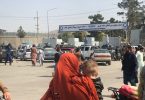The Kerala government on Wednesday shifted a station house officer (SHO) in north Kerala’s Kannur district for issuing a notice to a local masjid committee warning that there should not be any hate speech during Friday prayers in the backdrop of the controversy surrounding former Bharatiya Janata Party spokesperson Nupur Sharma’s comment on Prophet Mohammed.
The Mayyil police station SHO Biju Prakash had issued a notice to the committee last week to ensure that there is no controversial speech in the mosque after Friday prayers.
A statement issued by the chief minister’s office (CMO) said such a notice was “completely unwarranted and contrary to the view of the Left Democratic Front (LDF) government”, news agency PTI reported.
Prakash had also said that strict action will be taken against those who vitiate communal harmony prevailing in the region. Later, many Muslim outfits including Samsatha Jamayuthul Ulema criticised the circular saying it was an insult.
“The SHO had issued the notice without understanding the government policy. Hence the director general of police removed him from the post with immediate effect,” said an official statement from the government.
The SHO later reportedly admitted to higher officials that “he acted in haste to avert a possible tension.” But some officials of the police station said he had acted after receiving intelligence reports of possible tension and was made a scapegoat.
The government statements came in the wake of criticism of the police action by the opposition, with Kerala Pradesh Congress Committee (KPCC) vice-president V T Balram referring to the recent alleged hate speech by veteran politician P C George at a temple event and questioning whether the LDF government was going to issue notices to temple committees in the state to ban hate propagandists, PTI reported.
Claiming that “misleading propaganda” was being carried out against the government in connection with the notice, the CMO statement said that at a time when some vested forces were allegedly trying to create communal tensions in the state, it was important to preserve the friendship and peace that exists between the various faiths, religious institutions and the general public.
The statement also clarified that the government was not of the opinion that communal propaganda was being carried out in the mosques.







